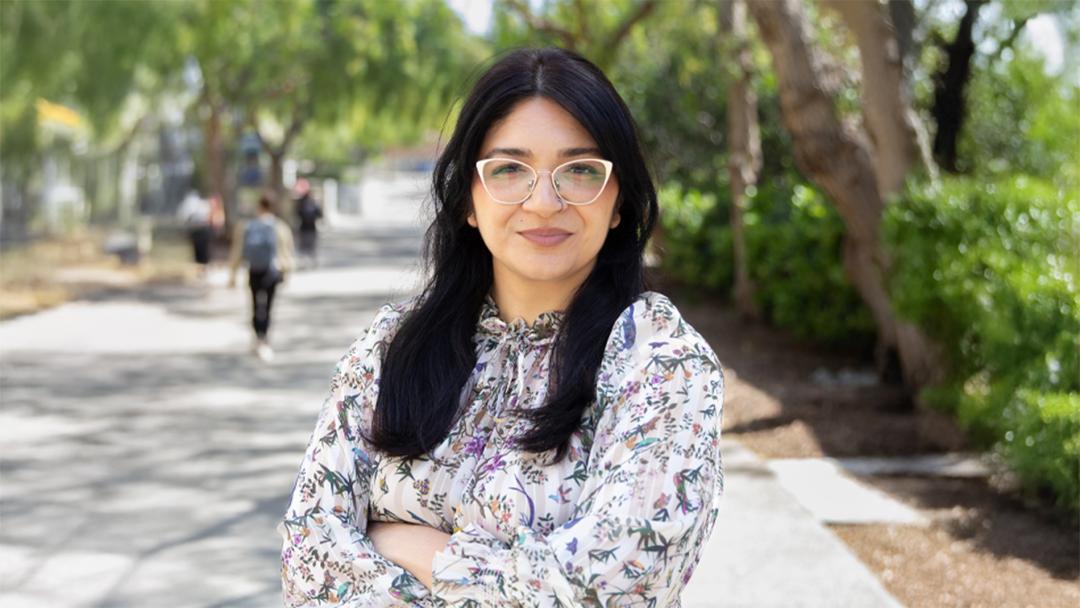
Jes Torres Behravesh reacts to winning NIJ fellowship
Jes Torres Behravesh, a UC Irvine doctoral student in urban planning and public policy, was “shocked” upon being informed she had won a National Institute of Justice (NIJ) Graduate Research Fellowship (GRF) for 2024.
And, quite pleased.
“Graduate students apply for many highly competitive things, and we get used to rejection,” observes Behravesh. “When things work out it’s an amazing feeling, and it really validates the work you’re doing and the contribution you’re trying to make.”
According to the NIJ, “The goal of the GRF program is to increase the pool of scholars engaged in research that addresses the challenges of crime and justice in the United States, particularly at the state and local levels.”
Behravesh’s research project for the NIJ is titled “Fraud Narratives: The ecology of skepticism towards Latino immigrants.” It is based on two of her dissertation chapters that focus on the U visa. The U.S. nonimmigrant visa is intended for victims of qualifying crimes who have suffered substantial mental or physical abuse and are willing to assist law enforcement with the investigation or prosecution of the crime. It allows certain crime victims to live and work here and can lead to a path to legal permanent residency.
“The study examines how the rhetoric of lawmakers shapes how Latino immigrants are racialized in the U.S., particularly through prefigurative assumptions of fraud. I use the U visa as a case study of this to ask how fraud narratives persist even among programs meant to support such vulnerable populations,” Behravesh says.
“Additionally, as an urban studies scholar who focuses on immigration policy, I am concerned with locale and how space matters. So, part of this study compares how Orange County and Los Angeles County may or may not differ in their approaches to U visa certifications, a critical part of the petition process.”
A critical part of Behravesh’s acceptance as a GRF fellow was staying on top of NIJ newsletters and School of Social Ecology emails encouraging students to apply — and reaching out for some high-powered assistance when she did just that.
“I’d like to thank my advisor, Dr. María Rendón, and my committee for helping me iron out a strong project,” Behravesh says. “I’d also like to thank [criminology, law and society doctoral student] Rebecca Tublitz, a 2023 NIJ recipient who offered advice and responded to my questions, and [School of Social Ecology Assistant Director of Graduate Affairs] Irice Castro for organizing information sessions that helped advance my application materials.”
Rendón returned the compliment.
“Jes is a rising star,” says the associate professor of urban planning & public policy. “Her scholarship will advance our understanding of how rhetoric among policymakers informs pervasive narratives on immigrants, particularly those who are asylum seekers and victims of crime. This work is especially important in the political moment we are living. Further, her work will shed light on how this rhetoric informs local practices of law enforcement who interface with immigrant victims of crime. This research is not just academically strong science, but humanistic, calling attention to how the power of words sustain injustice and human suffering.”
Behravesh, who intends to defend her dissertation and earn her Ph.D. in Spring 2026, has a personal reason to be proud of her latest accomplishment. “As a Latina from a family of immigrants, it is an incredible honor to be able to produce research relevant to the lives of Latino immigrants and have that research be valued and supported.”
— Matt Coker